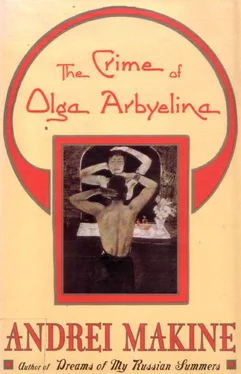Olga was beginning to feel slightly drunk. It was not the taste, now forgotten, of the wine Li had served, but intoxication at the nonchalance with which her friend conducted her life.
"I've even concocted my little theory on the subject of all these fantasies. This Mr. N who wants (mainly as a joke, but not only as a joke) to have himself photographed in the company of Tolstoy. What stopped him from shaking hands with him in real life? Minor hazards of existence. Not even his modest origins. Tolstoy used to walk about on foot just like him and lived in Moscow in the next street. It was not even his age: this Mr. N was twenty when Tolstoy died. In short, what kept them apart was the most trivial bad luck. The same that causes one passerby to slip on a banana peel and break his leg, while the one before just misses it."
"So you decided to give fate a little helping hand?"
"No. I simply wanted people who come here to learn to defy chance. To liberate themselves. Not to assume their own lives are the only possible existence. You know, I've even found a motto: Listen to this! 'Tolstoy is walking by on the opposite side of the street… Cross over!' They send one another these photos for April Fools' Day. But I want them to change their lives. I want to make them live waiting for the unexpected, miracles. I want…"
Olga nearly asked: "But Cupid and Psyche? Isn't it rather unlikely that your clients will meet them, even if they do cross the road?…" She held her peace. Despite Li's playful tone, she had sensed a vibrant, tense intonation in her voice. Which is how one presents one's credo to a friend, behind a smokescreen of jokes.
At that moment Li's face appeared in the next cutout, breathing life into a lady holding a white Pomeranian on a leash. The man who accompanied her had a pince-nez fixed in the empty oval of the face by means of a very fine wire. "Cunning, no?" exclaimed the photographer with a laugh, and… leaving the lady with her lapdog, she thrust her head into the hole with the pince-nez. When Olga went and placed herself behind the panel with the nymph laughter overcame them. They looked at each other from the two ends of the cellar-Li as the writer with his pince-nez and Olga as the satyr leaping out of the reeds. Then the satyr confronted the lady with the lapdog; after that it was Psyche and the huge vacationer in his striped bathing suit… Laughing, they stuck their heads into different panels and improvised conversations between the characters. "The satyr is walking by on the opposite bank… Cross over," cried Li between two outbursts of laughter.
A client arrived for a simple passport photo. And, without admitting it to themselves, they both became aware that the presence of this man, motionless in his dark suit, with his serious expression in front of the lens, was in reality no less strange, in his anonymous personal mystery, than all the nymphs, satyrs, and musketeers…
When the day drew to a close, and the sun's rays steadily lengthened, a feeling stole over them that their interlude of unreflecting laughter was coming to an end. Time was turned upside down, no longer flowing from its morning source but toward that moment when they would have to get up and say their good-byes, while trying to maintain a lighthearted, cheerful tone. It was that brief moment when solitudes are revealed; when one feels disarmed, incapable of checking the flight of the impalpable, gossamer stuff of happiness. Perhaps in an effort to hold onto the gaiety of the afternoon a little longer, Li gave a demonstration of a special camera. Its mechanism was concealed in a big book, a very clever simulation, with a thick binding and a gilded top. You could hardly see the reflection of the tiny lens…
"I bought it from an American officer," explained Li. "You put it on a shelf. It reacts automatically to a change of light. It takes five pictures at three-second intervals…"
Olga was hardly listening to her. When Li stopped talking and they could not let the silence continue any longer, they both spoke at the same time, in a swift collision of words, looks, and gestures:
"You know, I'm leaving L.M. for good."
"You know, I'm going back to live in Russia."
Their expressions of surprise, their comments, also clashed in a disorganized exchange of questions and answers.
"In Russia? Do you really think your fantastic photos will appeal to them over there? All those satyrs…"
"Olga, I'm sure he still loves you. Read his last book again, it's you he's talking about… Why rush to break it off like that?"
"But, of course they will. It'll be a breeze. You know, Olga, under that regime they've become too serious. They need to learn to laugh again."
"But you see, when there are some little things you can't stand any longer, it feels as if it's all over. We always see each other in hotel rooms. Every time he brings me a pair of embroidered slippers, a kind of pumps made of fabric. When we part in the morning he takes them back until the next time. It's his talisman. I suppose the pumps stay hidden in a drawer in his desk… Do you know what I mean?"
It was only in the street, on her way to the station, that Olga had this thought: for months each of them had been preparing to announce her break with the past. The man, this L.M., that she was going to leave. The Russia that Li was going to rediscover. And when the moment had come they had announced it as one, in a confused, breathless, false exchange. As they said their good-byes they were each in a hurry to return to solitude to explore the other's sudden future-the "tragedy" pictured by Li; Russia, that white gulf that had suddenly become a possible destination. They parted and the real conversation began, in their minds, the endless discussion with the other's ghost. "That exchange of words in which we spend half our lives," Olga said to herself as she left Li's house.
The street did not liberate her as she had hoped. The two days spent in Paris were concentrated into a dull weariness, filling her head with a buzz of obsessions, ones she had returned to a thousand times during the operation. Obsessions not easily brushed aside, massive as tablets of stone, that constantly tormented her mind: her age; this hollow sham of an exhausted love, very probably her last love; the need to consider this life as the only possible one… And now the vertiginous nothingness of Russia, which took her breath away; she did not even know what to think of it.
In a passageway in the Metro, when changing trains, she noticed a little gathering, their heads raised toward a commemorative plaque fixed to the wall. She went up to it, read the inscription: "At this spot on August 23, 1941, Colonel Fabien shot and killed the first German…" The newspaper she unfolded in the train contained an account of the second anniversary of the Liberation of Paris. One of the photos showed Molotov with a sour expression on his face, leaving the official platform as a mark of protest. "That was yesterday," she thought, "while Li was operating on me…" She felt she had her finger on the very essence of life: its chaotic improbability, the farcical absurdity of all this intermingling of destinies, dates, chances…
She opened her bag and took out a thick leatherbound volume, the concealed camera that, with childish curiosity, she had asked Li to lend her as they said their good-byes. The leather smelled good and the object itself was alluring; it had the compact efficiency of an intelligent machine. Above all, it reminded her of the panels in Li's studio. The marvelous simplicity of their subjects. "One should live like those characters on the plywood," thought Olga, suddenly happy. "I make everything complicated, I can't leave well enough alone. All that rubbish about embroidered slippers! No, Li's right: two characters, one situation. She ought to paint me: a woman leaving her lover. On plywood, with broad brushstrokes, without psychology: because that's where all the trouble starts!"
Читать дальше












